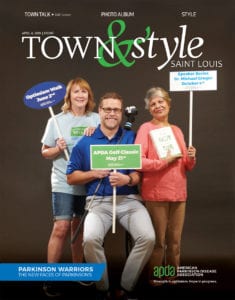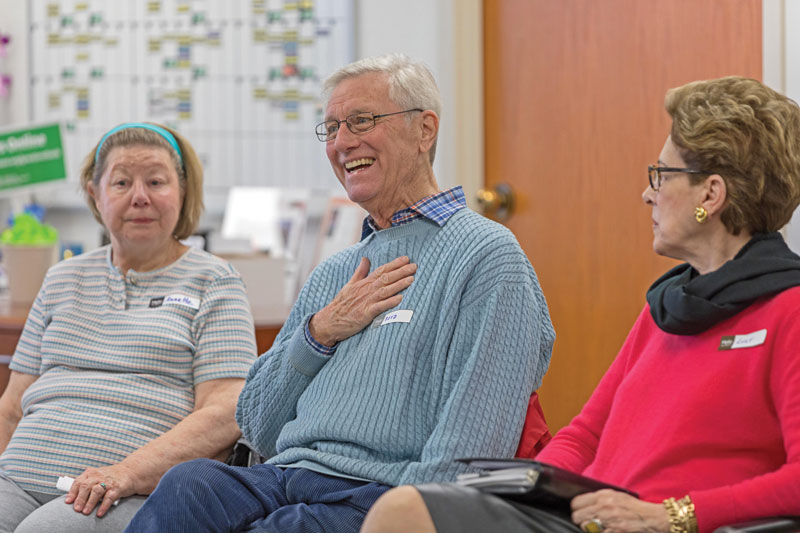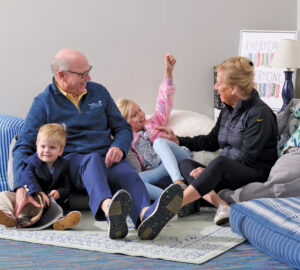Parkinson Disease is a neurological condition, but in many ways it strikes at the heart of every person diagnosed with it. Living with the disease means coming to terms with its steady encroachment on your ability to move, speak, and coordinate your body and limbs. And because it often affects people who are used to being active and vibrant, the condition is just as emotionally trying as it is physically debilitating.
 Risk for Parkinson’s increases with age, and researchers think genetics and environmental toxins such as pesticides and heavy metals play a part, says Deborah Guyer, executive director of the American Parkinson Disease Association (APDA) Greater St. Louis Chapter. Early signs of Parkinson’s include tremors, loss of smell, constipation, dizziness and trouble sleeping. As it progresses, people experience difficulty moving and walking, stooped posture, coordination problems and more.
Risk for Parkinson’s increases with age, and researchers think genetics and environmental toxins such as pesticides and heavy metals play a part, says Deborah Guyer, executive director of the American Parkinson Disease Association (APDA) Greater St. Louis Chapter. Early signs of Parkinson’s include tremors, loss of smell, constipation, dizziness and trouble sleeping. As it progresses, people experience difficulty moving and walking, stooped posture, coordination problems and more.
The condition is an intimidating one and the number of diagnoses is growing, but Guyer says important strides are being made against it, and APDA is helping fund those efforts. “In 1990, there were about 3 million cases of Parkinson’s worldwide; in 2015, the figure was 6.2 million, and it’s projected to reach 12.9 million in 2040,” she notes. “But we are close to a research breakthrough. There is a big push to find biomarkers, and I wouldn’t be surprised to see substantial progress in the next five to seven years.”
Research centers like Washington University actively are studying the disease, and celebrities such as Michael J. Fox, Linda Ronstadt and Neil Diamond have made their diagnoses public in an effort to educate others. So there is reason for hope through technology and heightened awareness, according to Guyer. “As greater segments of the population are affected by Parkinson’s, people want to learn more and spend more to stop it,” she notes.
To ease the burden of the disease on those who have the condition, and their families, APDA provides help in many forms. Its Chesterfield center offers exercise and dance classes, wellness seminars, support groups, advocacy training, caregiver services, an informative print newsletter and more. Guyer notes that exercise can help slow the progression of the disease, so staying active is key. Some of the local chapter’s programs and classes are available through its YouTube channel, so people all over the world can benefit from them.
Most APDA services are free to the Parkinson’s community, which means fundraising is an important component of the organization’s mission. April is Parkinson’s Awareness Month, and the local chapter has planned some exciting events to raise money during the year. Its 20th annual Golf Classic is May 21 in honor of late sportscaster Jack Buck, who had Parkinson’s. Held at Algonquin Golf Club, the event will welcome VIPs like St. Louis Cardinals executive John Mozeliak. On June 2, the APDA Optimism Walk takes place at Maryville University with activities for all age groups. And the organization’s Elliot and Mary Ann Stein Speaker Series will welcome bestselling author Dr. Michael Greger to Congregation Shaare Emeth Oct. 4. He will discuss how good nutrition and other healthful activities impact Parkinson’s and wellness in general, and the public is invited to attend.
“As time goes on, there will be more and more cases of Parkinson’s,” Guyer says. “We are committed to shedding light on this important need—and helping people with the condition and their families enjoy full lives.”
The American Parkinson Disease Association’s greater St. Louis chapter works to enhance quality of life for people with the condition, their families and caregivers in Missouri and southern Illinois. Pictured on the cover: Cathy Combs, Kevin Fairlie and Nalini Mehta. For information about upcoming APDA events, call 636.778.3377 or visit apdaparkinson.org/greaterstlouis.
Cover design by Allie Bronsky
Cover photo by Tim Parker Photography
Pictured above: The APDA provides support and encouragement for people with Parkinson.








